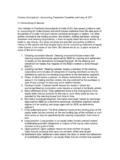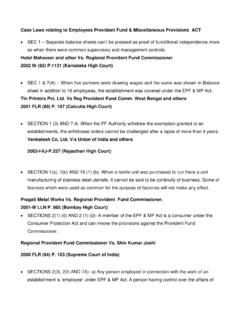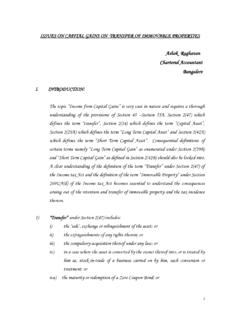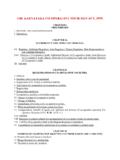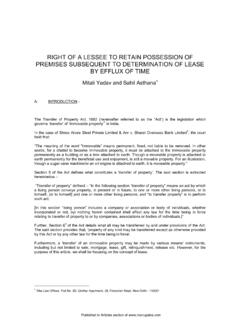Transcription of Taxability of Charitable & Religious Trusts - …
1 Taxability of Charitable & Religious Trusts Dr. Girish Ahuja , , FCA Chartered Accountant 1. What are Trusts ? Trusts have not been defined under the Income-tax Act, 1961. The dictionary meaning of " trust ", in so far as it relates to the realm of law, is "an arrangement" by which property is handed over to or vested in a person, to use and dispose it off for the benefit of another person." Trusts can be broadly classified into two categories, viz., (i) Public, (ii) Private. However, there may be Trusts which are a blend of both and are known as Public-cum-Private Trusts . 1a Public trust : A public trust is one which benefits the public at large or some considerable portion of it. A public trust can be of two types, viz.
2 , (a) Public Charitable trust , (b) public Religious trust . 1b Private trust : In case of private trust , the beneficiaries are individuals or families. Private Trusts are further broadly classified into: (i) Private specific trust , also referred to as Private Discretionary trust with beneficiaries and shares determinate in respect of both. (ii) Private Discretionary trust where the beneficiaries or their share or either is indeterminate. Private Trusts are created and governed by Indian Trusts Act, 1882 whereas Charitable Trusts are beyond this Act and have not been defined by law. According to section 3 of this Act, a trust is an obligation annexed to the ownership of the property and arising out of a confidence reposed in and accepted by the owner, or declared and accepted by him, for the benefit of another or of another and the owner.
3 The person who reposes or declares the confidence is called the author of the trust , the person who accepts the confidence is called the trustee, the person for whom the benefit is created is called the beneficiary. The subject-matter of the trust is called trust property or trust money, the beneficial interest or interest of the beneficiary is his right against the trustee as owner of the trust -property; and the instrument, if any, by which the trust is declared is called the instruments of trust . From the analysis of the above definitions, it may be observed that three types of persons are involved in the creation of a trust (i) Author of the trust the person who reposes or declares the confidence; (ii) Trustees , the persons who accept the confidence; (iii) Beneficiary , the person(s) for whose benefit the confidence is accepted.
4 In case of private Trusts , the beneficiary may be another person or the author. 1c Public-cum-Private Trusts : There may be certain Trusts whose part of the income may be applied for public purposes and a part may go to a private person or persons. Such Trusts are known as Public cum Private Trusts . Such Trusts , in respect of the portion of the income going to private person or persons are assessable as private Trusts and in respect of that portion of the income which is applied for public purposes, they shall be eligible for exemption under section 11 provided these trust are created before the commencement of Income-tax Act, 1961 before 1-4-1962. Public-cum-private created on or after 1-4-1963 shall not be eligible for 2 exemption u/s 11.
5 2. Creation of a trust (A) Creation of a private trust : A Private trust may be created inter vivos or by will. If a trust in created by will it shall be subject to the provisions of Indian Succession Act, 1925. The following are the requisites for creation of a trust : (i) The existence of the author/settlor of the trust or someone at whose instance the trust comes into existence and the settlor to make an unequivocal declaration which is binding on him. (ii) There must be a divesting of the ownership by the author of the trust in favour of the trustee for the beneficial enjoyment by the beneficiary. (iii) A trust property. (iv) The objects of the trust must be precise and clearly specified.
6 (v) The beneficiary who may be particular person or persons. Unless all the above requisites are fulfilled, a trust cannot be said to have come into existence. (B) Creation of a Public trust : Like the private Trusts , public Trusts may be created inter vivos or by will. In the case of Hanmantram Ramnath (Bom) it was held that "Although the Indian Trusts Act does not specifically apply to Charitable Trusts , there are three certainties required to create a Charitable trust . They are: (i) a declaration of trust which is binding on settlor, (ii) setting apart definite property and the settlor depriving himself of the ownership thereof, and (iii) a statement of the objects for which the property is thereafter to be held, the beneficiaries.
7 It is essential that the transferor of the property viz the settlor or the author of the trust must be competent to contract. Similarly, the trustees should also be persons who are competent to contract. It is also very essential that the trustees should signify their assent for acting as trustees to make the trust a valid one. When once a valid trust is created and the property is transferred to the trust , it cannot be revoked, If the trust deed contains any provision for revocation of the trust , provisions of sections 60 to 63 of the Income-tax Act will come into play and the income of the trust will be taxed in the hands of the settlor as his personal income. Public Trusts for Charitable or Religious Purposes The income derived from a property held under Charitable or Religious Trusts is exempt from tax u/s 11 subject to the fulfilment of certain conditions.
8 However, any profit or gain of a business carried on by such trust shall not be exempt unless the business is incidental to the attainment of the objectives of the trust /institution and separate books of account are maintained by such trust /institutions in respect of such business. 3. Exemption under sections 11 to 13 Subject to the provisions of sections 60 to 63, certain incomes of a Charitable / Religious trust or institution are not included in its total income to the extent and subject to the conditions specified in the Act. The word trust as used in the context of sections 11 to 13 of the Income-tax Act, includes in addition to the trust "any other legal obligation".
9 What is a "legal obligation"?: trust itself is a legal obligation, as the trustees are legally bound to apply the income of the trust in the manner and for the purposes specified by the author of the trust and it includes the following: (i) Property of the estate of deceased held by executor(s) under a legal obligation. (ii) Section 25 "companies" or "Guarantee Companies". Such companies are also holding the properties under legal obligation. (iii) Muslim Wakfs. 3 (iv) Religious Endowments under the Hindu Law. (v) Institutions registered under the Societies Registration Act, 1860 as the properties of the society are held under a legal obligation. (vi) Bar Councils, Chamber of Commerce, endowments, monasteries, maths, etc.
10 Are all instances where the "property is held under legal obligation". A Charitable organisation is ordinarily formed by way of a trust or a company limited by guarantee under section 25 of the Companies Act, 1956 or a society under the Societies Registration Act, 1860 (Central) or under a State Act in case there is one. As far as the tax angle in concerned, it makes no difference whether the Charitable organisation is formed by way of trust , a company or a society. A trust can be oral but for recognisation as a Charitable institution, it should be in writing and should have three certainties: (1) certainty as regards property which is the object of the trust ; (2) the object themselves; and (3) the beneficiaries for whom they are intended.
